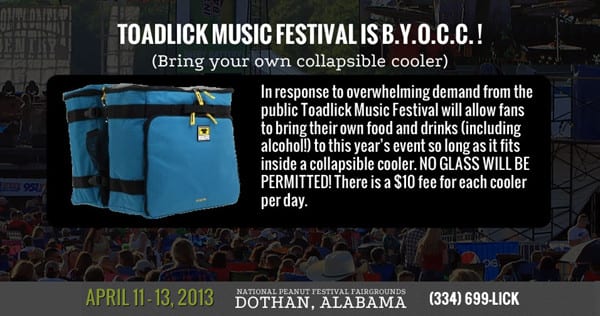
To BYOB or not to BYOB, that is the question! Food and drink concessions are a very important part of any event, but there is a larger strategy to consider. This edition at 'The Business of Fun' looks at how a smart BYOB policy allowing festival goers to bring their own food and drink, within limits, can increase tickets sales and make festivals more profitable.
One of the most popular ways for event attendees to enjoy themselves is to bring their own food and drinks with them to events. Of course, not every event allows for this since food and drink concessions are a critical revenue stream or local laws may prohibit the practice outright. Should a festival operator want to have a limited “bring your own beer” (BYOB) policy, but find themselves not able to do so because of local ordinances, it is possible to get an exception.
An exception was recently granted for the Toadlick Music Festival by the city of Dothan in Alabama after a formal city council debate. At issue was the established “brown bag” city ordinance originally put in place in 2005, in the interest of public safety, that prohibited BYOB at any event. Lance Griffin explains how the Toadlick festival went about applying for the exception.
Dothan officials appear to have carved out conditions in the city’s brown bag ordinance that will allow the 2013 Toadlick Music Festival to be a “bring-your-own” event. According to the proposed amendment, conditions would have to be met in order to receive an exemption, including;
The event must be a “special event” sponsored/promoted by a valid, responsible organization of good reputation, for a period not to exceed three days.
Griffin goes on to write that officials for the Toadlick Music Festival want to respond to popular demand to allow BYOB and will comply with all the guidelines set by the city.
Toadlick officials have said they plan on having additional security to ensure the safety of the patrons. Attorney Cliff Mendheim told the Dothan City Commission last month that the move to a bring-your-own event would help sustain the festival in the long run. Michael Shelley, a member of Toadlick’s management team, said many will choose to [bring] beverages and food in order to save money.
“Most of the people that I have talked to about Toadlick tell me that they may be able to afford a ticket, but they can’t afford everything else that comes along with it like the food and drink,” Shelley said. “Our idea is that if I have a family of four, I can pack water or Cokes or whatever along with some sandwiches and spend the day. This makes it much more affordable.”
Of note for festival owners is the limit on the amount of food and drink, including alcohol, that is allowed by Toadlick's BYOB policy. The limit is being enforced by the use of one collapsible cooler per person. The cooler allowance is part of the ticket purchase in the form of a $10 fee. The increase in ticket sales the popular BYOB policy spurs will easily compensate for whatever minor loss at the concession stands it may be responsible for.
The end result of the time taken to apply for the exception can be seen on the front page of the Toadlick Music Festivals website (main image above).
With or without the need for an exception to a city ordinance, festival operators allowing for limited BYOB should set an expectation with their patrons. Establishing guidelines for the "bring-your-own" policy as soon as possible, and as clearly as possible, will help limit policy debates at the entry gates. The language of BYOB policy should be formal and somewhat stern.
A good first step is to clearly state the container capacity, as Toadlick has, as well as types of items permissible (Example: no glass containers allowed). The BYOB policy guidelines should be easy to find on the festival website, and then displayed again during the ticket purchase process. One may even consider having the policy printed on the festival tickets or at least a prompt to review the policy before arriving at the venue.
Once the festival has made the BYOB policy clear and easy to understand, the onus for compliance will be on the ticket buyer. Policy compliance can be further ensured by augmenting formal policy with less formal expectations of etiquette. The language for BYOB etiquette should be friendly, even humorous, and posted at the entrance gates as well as throughout the festival grounds.
Concessions are a very important part of any event and it is not suggested that festivals undermine that lucrative revenue stream with an overly liberal BYOB policy. However, allowing limited BYOB can help large groups and big families save money, who in turn will buy more tickets. Using the Toadlick Music Festival as a guide, festival operators may wish to review their current BYOB policies and alter them to meet popular demand while still serving established business goals.
A per-day ticket fee is one way to serve both goals, but only if your current ticketing software provides you the tools to manage fees and build custom ticket options.
ThunderTix's festival plan can help you monetize your BYOB policy in the form of a fee or a custom ticket option. We also help improve festival profitability by lowering costs, most notable is that we do not charge you per-ticket fees. In addition to no fees, the ThunderTix festival plan helps keep ticket fraud at bay with support for multi-day wristbands and gate control using handheld barcode ticket scanners.
What do you think? Should every festival allow for some form of BYOB? Let us know in the comments below!